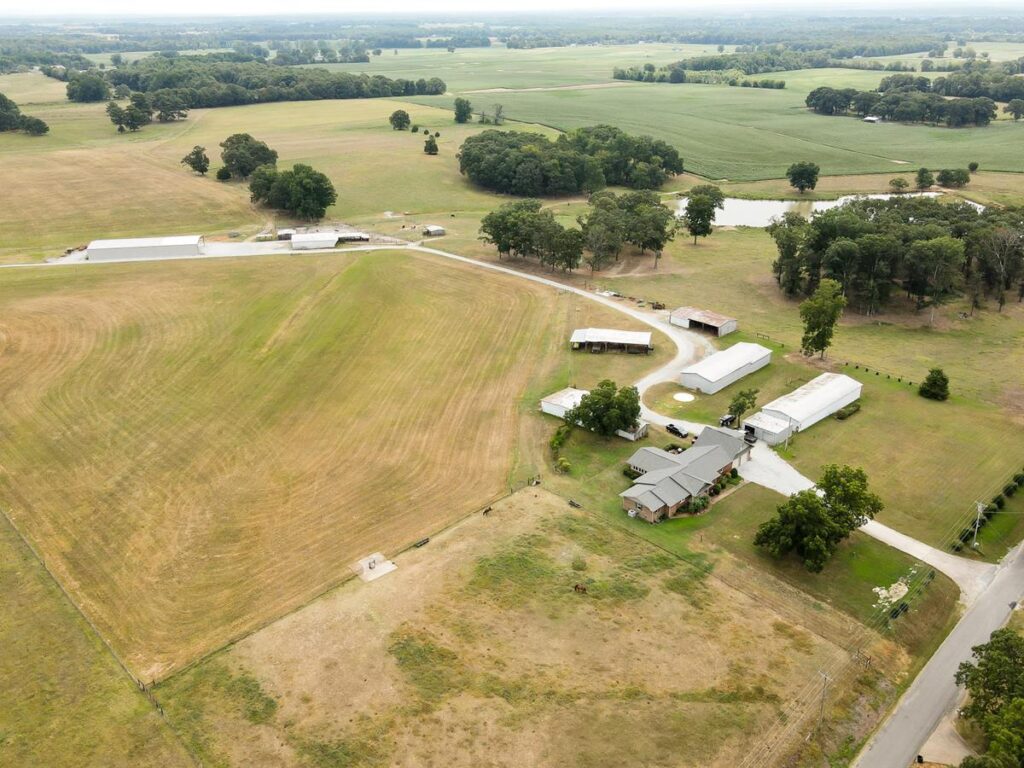
Factors such as soil quality, crop diversity, farm location, infrastructure, water access, market trends, and adherence to environmental regulations are crucial in determining Alabama farm valuations. Soil health, proximity to markets, water availability, and compliance with regulations greatly influence the value of agricultural land in the state. Understanding these factors is essential for those seeking to assess and enhance the worth of farms in Alabama.
Key Takeaways
- Soil quality assessment is essential for agricultural potential and land value.
- Crop diversity, including rotating crops, enhances farm valuations and soil health.
- Farm location impacts accessibility, resource availability, and market proximity.
- Well-maintained infrastructure and equipment add value and boost productivity.
- Adequate water access is crucial for sustaining agricultural activities and crop yield.
Soil Quality
Evaluating the soil quality of farms in Alabama is important for understanding their agricultural potential and overall land value. Alabama's diverse agricultural landscape is heavily influenced by varying soil types, each with its unique characteristics that can impact crop productivity. The state is known for its rich alluvial soils in the Tennessee Valley, providing excellent conditions for crops like cotton and soybeans. In contrast, the sandy soils along the Gulf Coast present challenges but are suitable for crops like peanuts and pecans.
Soil quality assessments consider factors such as texture, structure, fertility, drainage, and pH levels. These assessments help farmers make informed decisions regarding crop selection, irrigation needs, and soil management practices. Additionally, understanding the soil quality of a farm is essential for determining its long-term sustainability and resilience to factors like climate change and erosion.
Investing in soil health through practices like cover cropping, crop rotation, and proper nutrient management can enhance agricultural productivity and land value over time. By prioritizing soil quality in farm valuations, stakeholders can promote sustainable agricultural practices and optimize the economic potential of Alabama's farmlands.
Crop Diversity
Alabama's agricultural landscape showcases a rich tapestry of crops, highlighting the importance of embracing crop diversity in enhancing farm valuations. Crop diversity not only contributes to a more resilient and sustainable farming system but also plays a significant role in increasing the overall value of a farm in Alabama. Here are three key reasons why crop diversity is vital for farm valuations:
- Risk Mitigation: Growing a variety of crops helps farmers spread out their risks. Different crops have different vulnerabilities to pests, diseases, and weather fluctuations. By cultivating a diverse range of crops, farmers can minimize the impact of these risks on their overall yield and income.
- Soil Health: Different crops have varying nutrient requirements and impacts on the soil. Rotating crops can help maintain soil fertility, reduce soil erosion, and prevent the buildup of pests and diseases specific to certain crops.
- Market Opportunities: Diversifying the crop portfolio can open up various market opportunities. Farmers can cater to different consumer demands, explore niche markets, and adapt to changing market conditions by offering a wider selection of crops. This flexibility can lead to increased revenues and profitability for the farm.
Farm Location
Nestled in diverse landscapes across Alabama, farm location plays a substantial role in determining the overall value and potential of agricultural properties. The geographical placement of a farm can impact accessibility to markets, availability of resources, and susceptibility to weather patterns, all of which can influence the success and profitability of the operation.
—
| Factors | Impact on Farm Valuation |
|---|---|
| Proximity to Markets | Farms closer to major cities or distribution centers may have higher valuations due to easier transportation and access to consumers. |
| Soil Quality | Farms with fertile soil are often more valuable as they can support a wider variety of crops and are more productive. |
| Water Availability | Access to water sources for irrigation can significantly increase the value of a farm, especially in regions prone to drought. |
| Climate | Farms located in areas with favorable climates for specific crops may command higher prices due to increased productivity. |
| Surrounding Infrastructure | Proximity to essential services such as schools, hospitals, and agricultural supply stores can enhance the value of a farm. |
—
Infrastructure and Equipment
Farm infrastructure and equipment are pivotal components that greatly contribute to the operational efficiency and overall value of agricultural properties in Alabama. When evaluating a farm's worth, it is essential to take into account the quality and condition of its infrastructure and equipment. Here are three key factors related to infrastructure and equipment that impact farm valuations in Alabama:
- Barns and Outbuildings: Well-maintained barns and outbuildings provide essential storage space for equipment, livestock, and crops. The presence of structurally sound buildings adds value to the property as they indicate a level of investment in the farm's operations.
- Fencing and Irrigation Systems: Functional fencing and irrigation systems are vital for managing livestock and ensuring proper water distribution throughout the farm. Farms with well-designed and efficient irrigation systems are more likely to be valued higher due to their ability to support various types of crops.
- Machinery and Tools: The type and condition of machinery and tools on the farm significantly impact its productivity. Up-to-date equipment and tools demonstrate a commitment to modern farming practices and can increase the overall efficiency of farm operations, thereby positively impacting its valuation.
Water Access
Adequate access to water resources is a crucial aspect influencing the value and productivity of agricultural properties in Alabama. Water is essential for irrigation, livestock watering, and overall farm operations. Farms with reliable access to water sources such as rivers, streams, ponds, or wells are better equipped to sustain agricultural activities throughout the year, especially during dry spells or drought conditions.
In Alabama, where the climate can vary from region to region, having secure and consistent water access can greatly impact the types of crops that can be cultivated and the overall yield of the farm. Additionally, properties with water rights or established water infrastructure may command higher valuations due to the convenience and security they offer to farmers.
Farmers and investors looking to assess the value of agricultural properties in Alabama should carefully evaluate the quality and reliability of water access on the farm. Conducting thorough inspections of existing water sources and infrastructure, as well as considering potential upgrades or investments in water management systems, can provide valuable insights into the property's long-term productivity and sustainability.
Market Trends
In analyzing Alabama farm valuations, staying abreast of current market trends is essential for understanding the ever-evolving landscape of agricultural property values. Keeping a close eye on market trends can provide valuable insights into the factors influencing farm valuations. Here are three key market trends impacting Alabama farm valuations:
- Commodity Prices: Fluctuations in commodity prices directly impact the profitability of farms, influencing their overall value. Understanding the current market prices for crops and livestock is vital for evaluating the financial health of farms.
- Land Demand: The demand for agricultural land in Alabama can greatly affect farm valuations. Factors such as urban expansion, land development projects, and changing land-use regulations can impact the demand for farmland and, consequently, its value.
- Technology Adoption: The integration of technology in modern farming practices is rapidly changing the agricultural landscape. Farms that embrace technological advancements tend to be more productive and efficient, leading to higher valuations compared to traditional farms. Keeping up with technological trends in agriculture is pivotal for evaluating farm values accurately.
Environmental Regulations
With increasing scrutiny on environmental practices in the agricultural sector, adherence to stringent regulations has become a pivotal aspect of managing farm operations in Alabama. The state has implemented various environmental regulations to safeguard natural resources and guarantee sustainable farming practices. Farmers are required to comply with rules related to water usage, waste management, pesticide application, and land conservation.
One significant regulation is the Alabama Water Pollution Control Act, which imposes restrictions on discharging pollutants into water bodies. Agricultural activities must be carried out in a manner that minimizes water contamination and protects aquatic ecosystems. Additionally, the Alabama Department of Environmental Management oversees the enforcement of regulations concerning air quality, waste disposal, and environmental permitting.
Failure to comply with environmental regulations can result in fines, legal consequences, and reputational damage. Hence, farmers must stay informed about current regulations, implement best practices, and adopt environmentally friendly technologies to ensure compliance. By prioritizing environmental stewardship, Alabama farmers can contribute to sustainable agriculture and protect the state's natural resources for future generations.
Frequently Asked Questions
How Does the Farm's Historical Significance Impact Its Valuation in Alabama?
The historical significance of a farm in Alabama can influence its valuation by adding cultural and heritage value. Potential buyers may place a premium on properties with historical importance, impacting their perceived worth in the market.
Are There Any Specific Tax Incentives or Subsidies Available for Farms in Alabama That Could Affect Their Valuation?
Tax incentives and subsidies play a significant role in shaping farm valuations in Alabama. Understanding the specific benefits available to farms in the state is essential for evaluating their overall worth and financial viability.
What Role Does the Local Community and Support Networks Play in Determining the Value of a Farm in Alabama?
The local community and support networks are integral in determining the value of a farm in Alabama. Strong relationships with neighboring farmers, access to local markets, and community support can enhance the farm's reputation and overall value.
How Do Changes in Consumer Preferences and Demand for Organic or Sustainable Products Affect Farm Valuations in Alabama?
Changes in consumer preferences towards organic or sustainable products can have a substantial impact on farm valuations in Alabama. As demand for these products increases, farms that align with such practices may see higher valuations due to market demand and perceived value.
Are There Any Unique Cultural or Historical Factors That Could Impact the Value of a Farm in Alabama?
Cultural and historical factors play a significant role in influencing the value of farms in Alabama. These elements can include traditions, heritage, local customs, and historical significance, all of which can contribute to the property's overall worth.
Conclusion
To summarize, the important factors in Alabama farm valuations include soil quality, crop diversity, farm location, infrastructure and equipment, water access, market trends, and environmental regulations. These factors play a vital role in determining the overall value of a farm and should be carefully considered by potential buyers or investors. It is important to conduct thorough research and analysis to make informed decisions when evaluating farm properties in Alabama.
